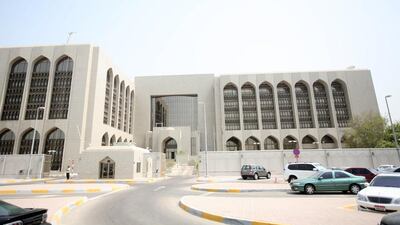The UAE's economy is expected to grow 2.4 per cent as the country gradually recovers from the pandemic-induced headwinds, according to the Central Bank of the UAE.
The non-oil economy of the Emirates is expected to expand around 4 per cent this year and next, while overall economic growth is expected to be 3.8 per cent in 2022, the banking regulator said on Thursday.
The UAE's banking system remained resilient amid the challenges posed by the coronavirus pandemic, the central bank said in its 2020 Financial Stability Report.
“The overall banking sector remained profitable and the liquidity and solvency ratios returned to pre-Covid levels towards the year-end,” Khaled Al Tameemi, governor of the Central Bank of the UAE, said on Thursday.
“The non-bank financial institutions, comprising of exchange houses, finance companies and the insurance sector also demonstrated resilience.”
The UAE introduced economic support measures worth Dh388 billion after the Covid-19 pandemic tipped the global economy into a worst depression since the 1930s. As part of its support measures, the central bank introduced a Dh50bn Targeted Economic Support Scheme (Tess) to boost liquidity in the financial and banking sector.
The Tess programme, which offered zero-cost collateral funding to banks to encourage lending to the broader economy, has been extended to the end of June next year in an effort to further support the economy.
“One year after its introduction, it is satisfying to see that the Tess has yielded intended positive impact for the UAE’s banking sector and the economy,” Mr Al Tameemi said.
“The overall banking sector liquidity returned to pre-Covid levels and the banking sector provided deferrals on loans and financing to more than 300,000 households, 10,000 small and medium enterprises and a significant number of private sector corporations.”
Some 309,393 people borrowed Dh4.9bn worth of loans as part of the Tess scheme, while Dh5.4bn was disbursed to 10,005 SMEs and Dh41.9bn to corporates, according to the central bank.
The regulator also said capital markets in both Abu Dhabi and Dubai grew, with the combined market capitalisation of the Abu Dhabi Securities Exchange (ADX) and Dubai Financial Market (DFM) reaching Dh1.1 trillion last year, up 19.6 per cent from 2019. However, in terms of domestic equity indices, the DFM share price index declined by 9.9 per cent year-on-year and the ADX index slid by 0.6 per cent year-on-year in 2020.
"[A] high level of uncertainty and risks are surrounding the global outlook for 2021. Lockdown measures are reintroduced in many countries following the increase in infections, which could lead to weaker growth than expected."
However, there are also some upside risks, such as the agreement in December on the terms of the UK’s exit from the EU, which has eliminated the no-deal Brexit downside risk, the central bank said.
Low-interest rates, ongoing global fiscal stimuli and booming stock exchanges could lead to bubbles, it added. Similarly, swings in cryptocurrency prices could exacerbate risks of drastic asset price corrections, according to the banking regulator.


